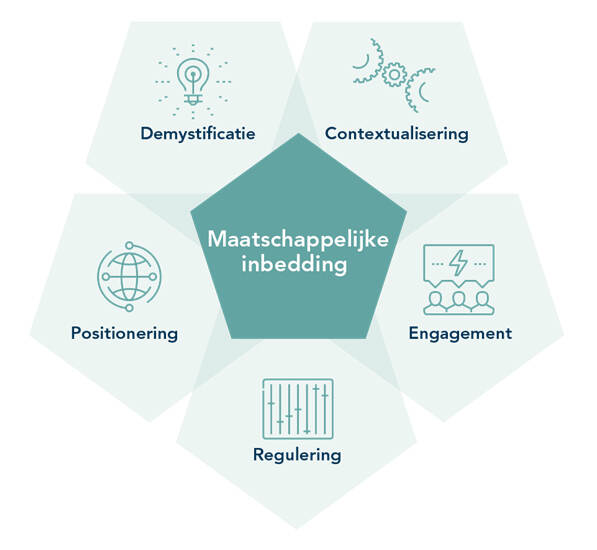WRR publishes Advisory AI report
WRR publishes Advisory AI report
The Scientific Council for Government Policy (Wetenschappelijke Raad voor Regeringsbeleid, WRR) released its advisory report on Artificial Intelligence (AI) to the government on Nov. 11, 2021. The final report is more than 500 pages long, but fortunately a summary is also available. The report contains many specific recommendations for the government, divided into five tasks, which I will outline in this article.
First, however, the question, what is AI? In this report, the WRR uses the definition of AI from the European High-Level Expert Group on AI: "systems that exhibit intelligent behaviour by analysing their environment and - with some degree of autonomy - taking action to achieve specific goals." This is quite broad, but that fits the broad applicability of AI. Because of AI's broad applicability, the WRR notes that AI is a systems technology, like electricity, that will not be easily controlled.
DEMYSTIFICATION
The first task is to define what we are talking about when we say AI. What can AI do and what can't it do? It is important to keep expectations of AI realistic and also be clear about the real risks, this is what the WRR calls "AI wisdom. For this, the government needs knowledge. With this, issues such as archiving, and transfer of knowledge can also be addressed.
- Make learning about AI and its application an explicit goal in government action.
Not only the government benefits from a realistic view of AI. Society also benefits from AI wisdom. The government can contribute to this with algorithm registries in which it discloses its use of AI.
- As a government, encourage the development of AI wisdom among the general public, starting with the creation of algorithm registries.
CONTEXTUALIZATION
The second task has to do with how AI is or will be applied. AI depends on many supporting technologies that must all work together and continue to work together. Because AI is a broad topic, the WRR recommends that the government looks for a specialization for the Netherlands in order to give direction to the Netherlands' AI identity.
- Choose explicitly for a Dutch AI identity and investigate where adjustments to the technical environment are needed in the relevant domains.
An AI system is often best in a specific context. To take this into account, specific training may be important so that the people using the system know its limitations. In addition to individual certification, the WRR also recommends that systems and organizations should be certifiable.
- Strengthen the skills and critical capacity of individuals working with AI systems and develop a system of training and certification for this purpose.
ENGAGEMENT
The third task is about involvement, who should be involved in the development of and discussions about AI? The WRR argues that currently technical specialists have the lead role, while society struggles to have a say. Civil society organizations should be given more opportunities to join the conversation about AI. This could also further expand their knowledge about AI.
- Strengthen the capacity of civil society organizations to broaden their work into the digital domain, especially with regard to AI.
To ensure that the effects of AI systems can be tracked, it is important for developers to see reactions and comments from users and stakeholders. By doing so, they can fix problems that they did not notice. For government agencies, the WRR even recommends a mandatory standard if an AI system makes decisions with major implications for citizens.
- Dedicate proper feedback between the developer of AI, its users, and those affected by it in practice.
REGULATION
The fourth task is about laws and regulations. What are regulations needed right now? Currently, rules are already being made that target AI for specific applications, but if AI becomes more common, more indirect effects will emerge for which rules are also needed. Legislators need to start making decisions about how AI will be deployed and think about how they see the digital environment.
- Link the regulation of AI to a discussion about the design of the digital environment and set a broad legislative agenda.
The government must remain attentive to the public discussion about AI. For example, new applications and opportunities are developing and dependencies are changing. This requires research but also surveillance by regulators who need knowledge.
- Through legislation, actively steer developments around surveillance and data collection, the skewed relationship between public and private in the digital domain and concentration of power.
POSITIONING
The fourth task is the position of the Netherlands relative to other countries in the field of AI. The WRR emphasizes that a systems technology always involves competition between countries and that the technology is capable of influencing international conflicts. This drives the AI race between China and the US. If we want to remain relevant as the Netherlands, we must cooperate internationally in order to benefit from AI and also to be able to address risks.
- Strengthen Dutch earning capacity with AI diplomacy focused on international partnerships, especially within the EU.
The subtitle of this task is "from nation to network”. By this the WRR wants to indicate that national borders are less relevant in a digital world. The connections between devices and the systems built on them are more important in the digital world, which is why the government must have insight in how the Dutch infrastructure is built. This can be important for national security because the government can use these insights to see where weaknesses are.
- Know how to defend yourself as a country even in the AI era; therefore, strengthen Dutch capabilities against the growing "information war" and the export of digital dictatorship.
SUPPORTING THE TASKS
In addition to the policy points, the WRR advises the government to build a policy structure. This could initially be a coordination centre for AI in which administrators, regulators and implementing organizations can consult and learn from each other. In the future, consider ideas such as an AI ministry or a specific regulator for AI.
- Build a policy infrastructure for AI, starting with an AI coordination centre provided with political anchorage through a ministerial vice council.
Conclusion
The WRR gives the government enough food for thought for the time being. The WRR's five tasks indicate a desire to take a broad view of AI, and I believe this is the right approach. The question is which parts of the advice will be adopted in the future. I hope as much as possible.
For questions, please contact Jos van der Wijst (wijst@bg.legal).

Details
More questions?
If you were not able to find an answer to your question, contact us via our member-only helpdesk or our contact page.





